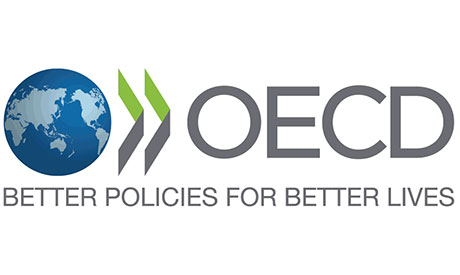
The Organisation for Economic Co-operation and Development (OECD) logo.
The Organisation for Economic Cooperation and Development (OECD) has slightly revised its expectation for the global economic growth to 5.7 percent in 2021, down from 5.8 percent projected in May, according to its updated report on the global economic outlook.
Yet, OECD has revised its projections for the global GDP to 4.5 percent in 2022, up from 4.4 percent predicted in May, according to the report.
The report said that the global economic recovery remains strong, backed by government and central bank support and by progress in vaccination rolling out.
However, although the global GDP has gone above the pre-pandemic level, the recovery remains uneven, with countries emerging from the crisis and facing different challenges, according to the report.
“Large differences in vaccination rates between countries are adding to the unevenness of the recovery. Renewed outbreaks of the virus are forcing some countries to restrict activities, resulting in bottlenecks and pressures on supply chains,” said the report.
On the other hand, rapid increase in demand as economies recover has caused price hikes in key commodities; particularly oil and metals, according to the report.
It also indicated that food prices are also rising, boosting prices, especially in emerging markets, and disruptions along supply chains caused by the pandemic have escalated cost pressures.
Meanwhile, shipping costs have increased sharply, according to the report.
On the inflation outlook, the report stressed that it varies markedly, as it has risen sharply in the US and some emerging market economies but remains relatively low in many other advanced economies, particularly in Europe.
“These inflationary pressures should eventually fade. Once bottlenecks are resolved, price increases in durable goods, such as cars, are likely to ease quickly as supply from the manufacturing sector rapidly picks up. Consumer price inflation in G20 countries is projected to peak towards the end of 2021 and slow throughout 2022. Although sizeable pay increases are happening in some sectors that are reopening such as transportation, leisure and hospitality, overall wage pressure remains moderate,” the report illustrated.
Short link: